PHUKET: The Phuket Marine Biological Centre and Phuket Public Health have set up jellyfish awareness posters and sting treatment stations along Phuket's popular west coast beaches.
The stations, also being established along other parts of the Andaman coast and at tourist spots in the Gulf of Thailand, include vinegar for the treatment of toxic jellyfish stings.
Two stations have been set up at Patong and at Sirinath National Park, near Phuket International Airport, with single stations at Nai Yang, Nai Thon, Bang Tao, Surin, Kata, Kamala, Karon and Nai Harn.
Officials note that the establishment of the stations is a precaution, not in reaction to a growing number of jellyfish stings.
Jellyfish are gradually becoming more prevalent around the world, in non-tropical as well as tropical zones.
Some experts believe the rise of jellyfish is because of overfishing and the reduction of the number of natural predators, including turtles.
Recent deaths and narrow escapes from box jellyfish, the most deadly type of jellyfish, have been recorded south of Phuket in Langkawi, Malaysia, and to the east in Cha-Am, on the Gulf, and Koh Lanta, in Krabi.
In September last year, Britain's Daily Mail - world's most popular online news site - carried a report connecting Phuket with a severe box jellyfish sting inflicted on a British tourist.
Phuket media was able to establish that although the British woman, on a travelling holiday with her family, was treated for her wounds on Phuket, the sting actually occurred much earlier, while she was holidaying in the Gulf of Thailand.
She did not have vinegar applied to the sting at the time it occurred, so the box jellyfish toxins continued to eat away at her flesh.
Vinegar is reckoned by experts to be essential for the treatment of box jellyfish and most other marine stings.
While the vinegar does not ease the pain, it rapidly reduces the massive flesh-eating toxicity in a box jellyfish sting.
Researchers from the Phuket Marine Biological Centre have been more closely tracking the spread of different kinds of jellyfish and marine creatures in Malaysian and Thai waters since an infestation alarmed tourists on Patong and other popular west coast beaches in 2009.
Seasonal currents are believed to largely protect Phuket's west coast beaches from most jellyfish. Sightings are more likely to be reported around Phang Nga Bay or along mangrove coastal regions.
The Phuket Marine Biological Centre won Phuketwan's 2012 Award for Environmental Excellence for its good work attempting to save Phuket's dolphins, turtles, dugongs and other marine life.








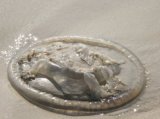
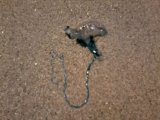

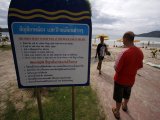

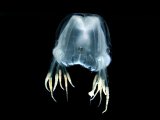


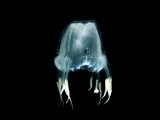
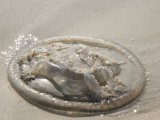
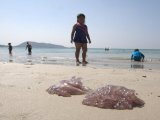





Good job PMBC. I will have to take a look at these stations and see if they include the proper procedures for procedures for bluebottle/Portuguese man-o-war stings, which we get here every monsoon season, and which vinegar and fresh water will actually worsen by causing any remaining nematocysts (stingers, like microscopic harpoons) to discharge. The current recommendation is that if you don't know what stung you, only rinse with sea water. Use vinegar or fresh water only if you are certain it's a jelly.
Posted by NomadJoe on February 9, 2013 17:29